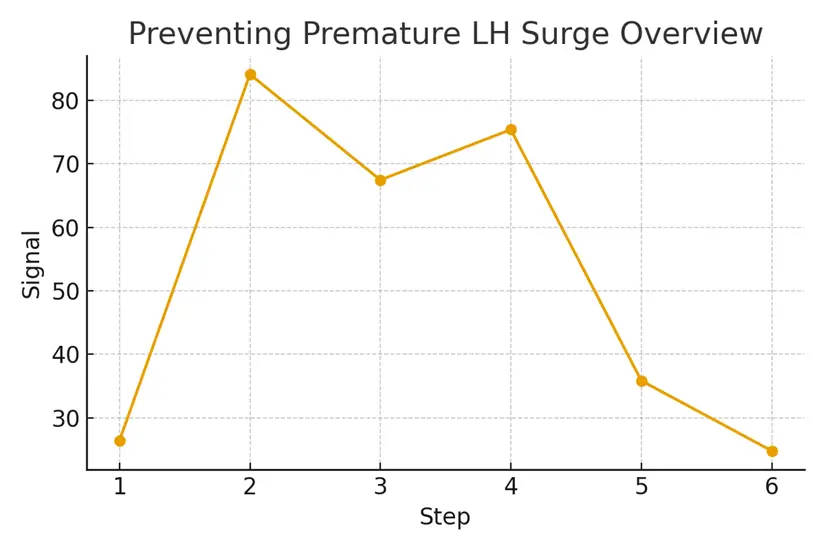
This article explains preventing premature LH surge within the IVF Protocols & Medications pathway. It focuses on practical choices that truly affect outcomes, budgets, and timelines—so you can move forward feeling informed and confident.
What It Is
Preventing Premature LH Surge in plain English:
An LH surge is your body’s natural signal to ovulate. In an IVF cycle, we don’t want ovulation to happen early, because eggs must be retrieved before they are released. Preventing a premature LH surge means using specific medications and timing to keep ovulation under control until retrieval day.
This step sits at the heart of IVF stimulation, shaping how follicles grow, when retrieval happens, and whether eggs are actually available.
Who It Helps
You may benefit from LH-surge prevention strategies if you:
- have a history of early ovulation
- are a fast responder to stimulation
- have high LH levels at baseline
- showed signs of premature surge in past IVF cycles
- have certain patterns in ultrasound, hormone labs, or cycle length
Sometimes a different approach is better if LH remains low, response is slow, or other medical factors make suppression unnecessary.
Step-by-Step
Here’s the simple flow of how your clinic prevents a premature LH surge:
- Start ovarian stimulation medications
- Frequent monitoring (ultrasound + estrogen, LH bloodwork)
- Add suppression medication — usually GnRH antagonists or similar options
- Watch for LH trends — to catch any early rise
- Trigger shot at the right moment
- Egg retrieval before ovulation occurs
These timing checkpoints help protect egg quality, avoid cancellations, and reduce last-minute stress.
Pros & Cons
Pros
- Prevents cycle cancellation due to early ovulation
- Improves control over follicle growth and timing
- Protects egg availability for retrieval
- Works well for both low and high responders
- Allows precise planning for the trigger shot
Cons
- More injections or medications may be needed
- Some suppression drugs can be expensive
- Rare side effects: headaches, bloating, injection-site discomfort
- Too much suppression can slow follicle growth (rare but possible)
Costs & Logistics
Expect costs related to:
- suppression medications (e.g., antagonist injections)
- additional monitoring labs
- prior authorizations for certain drugs
- coordination for pharmacy delivery and refills
Using a medication calendar, reminders, and cost-tracking sheet helps avoid rushed orders and surprise bills.
What Improves Outcomes
Things that actually change results:
- starting suppression at the right follicle size
- customized timing based on past cycles
- monitoring LH every 1–3 days during peak growth
- rapid communication between you and the clinic
- adjusting dose if LH begins to rise unexpectedly
Things that rarely make a big difference:
- supplements
- timing intercourse or lifestyle changes
- stress myths around “causing” LH fluctuations
Case Study
A 36-year-old patient with a history of early ovulation had two previous IVF cycles cancelled.
Her new clinic introduced:
- earlier LH monitoring
- antagonist medication added at a smaller follicle size
- fast communication if labs shifted
With this plan, her cycle progressed smoothly, and she reached retrieval with 11 mature eggs — her best outcome.
The key was predicting risk and adjusting before the surge happened.
Mistakes to Avoid
- starting antagonist medication too late
- skipping or delaying monitoring appointments
- not checking insurance approval for suppression meds
- assuming the LH surge can’t happen early
- misunderstanding symptoms and not reporting them
Checklists and clear instructions help prevent small misses that can lead to cycle cancellation.
FAQs
Q. What exactly is a premature LH surge?
Ans. It’s when your body starts ovulating before the clinic plans to retrieve the eggs — which can cause a cancelled or compromised IVF cycle.
Q. How do clinics prevent it?
Ans. With medications like GnRH antagonists or agonist protocols that keep your LH level controlled until retrieval day.
Q. Can a premature surge still happen even with medications?
Ans. Rarely, yes. This is why close monitoring of LH levels is essential.
Q. Does preventing an LH surge affect egg quality?
Ans. No — the medications simply control timing. They don’t harm egg or embryo quality.
Q. Is everyone at risk for a premature LH surge?
Ans. No. It’s more common in fast responders, people with shorter cycles, or those with high baseline LH, but it can happen unpredictably in any cycle.
Next Steps
- Free 15-min nurse consult
- Upload your labs
- Get a personalized cost breakdown for your case
Related Links
- IVF Protocols & Medications
- Intended Parents
- Become a Surrogate
- Fixed‑Cost Packages
- SART
- CDC ART
- ASRM

Dr. Kulsoom Baloch
Dr. Kulsoom Baloch is a dedicated donor coordinator at Egg Donors, leveraging her extensive background in medicine and public health. She holds an MBBS from Ziauddin University, Pakistan, and an MPH from Hofstra University, New York. With three years of clinical experience at prominent hospitals in Karachi, Pakistan, Dr. Baloch has honed her skills in patient care and medical research.





